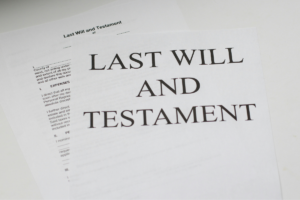If you have a Will, congratulations! Recent statistics indicate that 60-70% of American adults do not have Wills. Of those who do have Wills, most begin the process of making a Will sometime in their 30s or 40s. Very often, the galvanizing event is the birth of a child. But once you have a Will, how do you know when it is time to update your Will?
How often should you update your Will?
 Note that I am using the term “Will” in both a specific and generic sense. This includes documents that direct the distribution of assets in the event of death. In addition to a Will, these include: trusts, beneficiary designations on life insurance or retirement accounts, pay on death designations (PODs), transfer on death designations (TODs), and forms of joint ownership with survivorship designations. In general, updating your Will and other types of transfer designations should be considered every three to five years, or whenever you have a major life event.
Note that I am using the term “Will” in both a specific and generic sense. This includes documents that direct the distribution of assets in the event of death. In addition to a Will, these include: trusts, beneficiary designations on life insurance or retirement accounts, pay on death designations (PODs), transfer on death designations (TODs), and forms of joint ownership with survivorship designations. In general, updating your Will and other types of transfer designations should be considered every three to five years, or whenever you have a major life event.
Major life events will include such things as a marriage, a divorce, the birth of a child, the death of a spouse, and receiving a windfall of money like an inheritance or winning the lottery. As with many things, it is usually best to address these events before they occur, if possible. For instance, if you are considering getting married, you can update your Will in anticipation of that event.
What events might necessitate Will maintenance?
Once you have your Will and estate planning documents in place, you may need to update your will if a person you have named as executor, trustee, or guardian for minor children is no longer an appropriate choice. The death or disability of the person named is an obvious example. However, it can simply be that you and the person named are no longer close.
In my practice, updating very often occurs when the children of clients have reached maturity. They are now in a position to serve as executors and trustees. Less happy updates occur when it is determined that a beneficiary is not able or capable of receiving an inheritance outright. These circumstances may include problems managing money, addictions, and creditor issues. Properly drafted documents can still provide means to assist beneficiaries with these types of difficulties and insure that their needs are met.
The legal process of proving a Will (probate) requires that the original document be submitted to the probate court. It is possible to probate a copy of a Will if you have misplaced the original. However, I recommend that you update with a new, properly executed document.
Tax law changes can also trigger a Will update
Changes in the tax laws have been a driving force in updating Wills throughout my legal career.
In 1977, the estate exclusion amount (the amount of an estate not subject to tax) was $120,667. The tax rate as you exceeded the exclusion amount ranged from 30% to 70%. In 2000, the estate tax exemption amount was $675,000 and the tax rate as you exceeded the exemption amount ranged from 37% to 60%.
Twenty-five years later, in 2025, the exemption amount is $13,990,000 and the tax rate is 40%. However, in 2026, the current exemption reduces to $5,000,000 indexed to inflation starting from 2018. The tax rate continues at 40%. If history is any indication, we can expect these rates to continue to change. And, while exemption amounts exclude taxation on the majority of the estates, this area continues to evolve as well.
Some Wills made 50 years ago continue to effectively reflect the wishes of the person. However, in most cases, these documents will need updating and adjusting to reflect the changes most of us experience in life. Again, a good rule of thumb is to review your planning documents every three to five years or when you are presented with a major life event.

